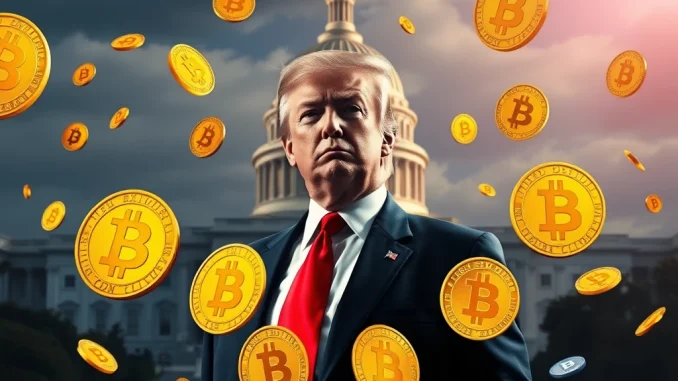
The cryptocurrency world is no stranger to political crosscurrents, but the latest twist involves a familiar face: Donald Trump. As the former president ventures deeper into the digital asset space, his crypto dealings are reportedly throwing a wrench into bipartisan efforts to establish clear crypto regulations in the United States. This revelation comes straight from Capitol Hill, with Rep. French Hill (R-AR) highlighting the growing complications. Is Trump’s foray into memecoins and stablecoins creating an unforeseen regulatory quagmire? Let’s dive into the details and explore the potential impact on the future of crypto legislation.
Why Trump Crypto Ventures Are Causing Legislative Headaches
According to Rep. French Hill, the increasing crypto involvement of Donald Trump and his family is introducing a layer of complexity to the already intricate process of crafting bipartisan crypto legislation. Here’s a breakdown of why this is becoming a significant issue:
- Perception of Conflict of Interest: Trump’s active participation in the crypto market, including launching memecoins and potentially stablecoins, raises eyebrows among lawmakers. Critics argue that his personal financial interests could influence his stance and, by extension, the Republican party’s approach to crypto regulation.
- Erosion of Bipartisan Trust: For effective legislation, especially in a politically divided landscape, bipartisan consensus is crucial. Trump’s ventures, viewed skeptically by some Democrats, risk widening the partisan gap and making it harder to find common ground on crypto regulation.
- Distraction from Core Issues: The controversy surrounding Trump’s crypto activities can divert attention and energy away from the substantive discussions needed to develop sound and comprehensive crypto legislation. Instead of focusing solely on the merits of various regulatory proposals, lawmakers might find themselves entangled in debates about potential conflicts of interest and political motivations.
Sen. Elizabeth Warren, a vocal critic of cryptocurrencies, has already labeled Trump’s crypto ventures a “grift,” further fueling the debate and underscoring the political sensitivity surrounding this issue. This heightened scrutiny adds another layer of difficulty to achieving bipartisan agreement on crypto legislation.
The Spotlight on Stablecoin Regulation and the STABLE Act
Amidst this political backdrop, crucial pieces of legislation are making their way through Congress. Notably, the STABLE Act is slated to be discussed this week, as reported by Decrypt. This bill is particularly significant because it aims to bring clarity and regulatory oversight to stablecoin regulation.
What is the STABLE Act?
The STABLE Act, if passed, would:
- Define Stablecoins as Banks: It proposes to regulate stablecoin issuers as banking institutions, subjecting them to traditional banking regulations.
- Require FDIC Insurance: Stablecoin issuers would be required to obtain Federal Deposit Insurance Corporation (FDIC) insurance, similar to traditional banks, to protect consumers.
- Mandate Federal Reserve Approval: Issuers would need to seek approval from the Federal Reserve and other banking agencies before issuing stablecoins.
Why is stablecoin regulation important?
Stablecoins, cryptocurrencies pegged to a stable asset like the US dollar, are critical to the crypto ecosystem. They facilitate trading, lending, and borrowing within the crypto space. However, their rapid growth and potential systemic risks have prompted calls for robust stablecoin regulation. Without clear rules, concerns remain about:
- Consumer Protection: Ensuring that stablecoins are truly backed by reserves and that consumers are protected in case of issuer failure.
- Financial Stability: Preventing stablecoins from becoming a source of instability in the broader financial system, especially given their increasing interconnectedness with traditional finance.
- Money Laundering and Illicit Activities: Addressing concerns that stablecoins could be used for illicit activities if not properly regulated.
Memecoin Mania and Its Impact on Crypto Perceptions
Beyond stablecoins, Trump’s foray into memecoins also adds another dimension to the discussion. Memecoins, often characterized by their viral nature and community-driven value, are inherently volatile and speculative. Trump’s association with memecoins, while potentially lucrative, can further complicate the public and policymakers’ understanding of the broader crypto market.
The Memecoin Phenomenon:
Memecoins like Dogecoin and Shiba Inu have demonstrated the power of internet culture and social media to drive market trends. They often lack fundamental value and are primarily driven by hype and sentiment. While some investors have made fortunes riding the memecoin wave, many others have experienced significant losses due to their extreme volatility.
Memecoin Impact on Crypto Image:
Trump’s involvement in memecoins could:
- Reinforce Negative Stereotypes: Critics might use it to paint the entire crypto space as unserious, speculative, and lacking in real-world utility, hindering the progress of thoughtful crypto regulation.
- Fuel Regulatory Skepticism: Policymakers already wary of crypto’s risks might become even more cautious, potentially leading to stricter and less innovation-friendly crypto regulation.
- Complicate Public Education: The memecoin frenzy can make it harder to educate the public about the diverse applications and potential benefits of blockchain technology and cryptocurrencies beyond speculative trading.
Navigating the Complexities of Crypto Regulation
The situation highlights the intricate dance between politics, personal interests, and the burgeoning crypto industry. Achieving effective and balanced crypto regulation requires careful consideration of various factors, including technological innovation, consumer protection, financial stability, and national competitiveness.
Challenges in Crypto Regulation:
- Technological Pace: The rapid evolution of blockchain technology and cryptocurrencies makes it challenging for regulators to keep up and create future-proof rules.
- Decentralization Dilemma: The decentralized nature of many cryptocurrencies poses unique challenges for traditional regulatory frameworks designed for centralized entities.
- Global Coordination: Crypto is a global phenomenon, requiring international cooperation and coordination to prevent regulatory arbitrage and ensure consistent standards.
- Balancing Innovation and Risk: Regulation must strike a delicate balance between fostering innovation and mitigating the inherent risks associated with this nascent technology.
Looking Ahead: The Future of Crypto Legislation
As Congress grapples with these complexities and the shadow of Trump’s crypto ventures looms, the path forward for crypto legislation remains uncertain. The coming weeks and months will be crucial in determining whether bipartisan efforts can overcome these hurdles and pave the way for a clear and comprehensive regulatory framework for the crypto industry.
Key Takeaways:
- Trump’s crypto involvement is adding a layer of political complexity to crypto legislation efforts.
- The STABLE Act and stablecoin regulation are critical issues currently under consideration.
- Memecoin speculation and its association with prominent figures can influence public perception and regulatory approaches to crypto.
- Navigating the challenges of crypto regulation requires a balanced approach that fosters innovation while mitigating risks.
The crypto community and stakeholders will be closely watching how these developments unfold, hoping for a regulatory environment that encourages responsible innovation and protects consumers without stifling the potential of this transformative technology. The intersection of politics and crypto is proving to be a fascinating, and potentially turbulent, journey.



